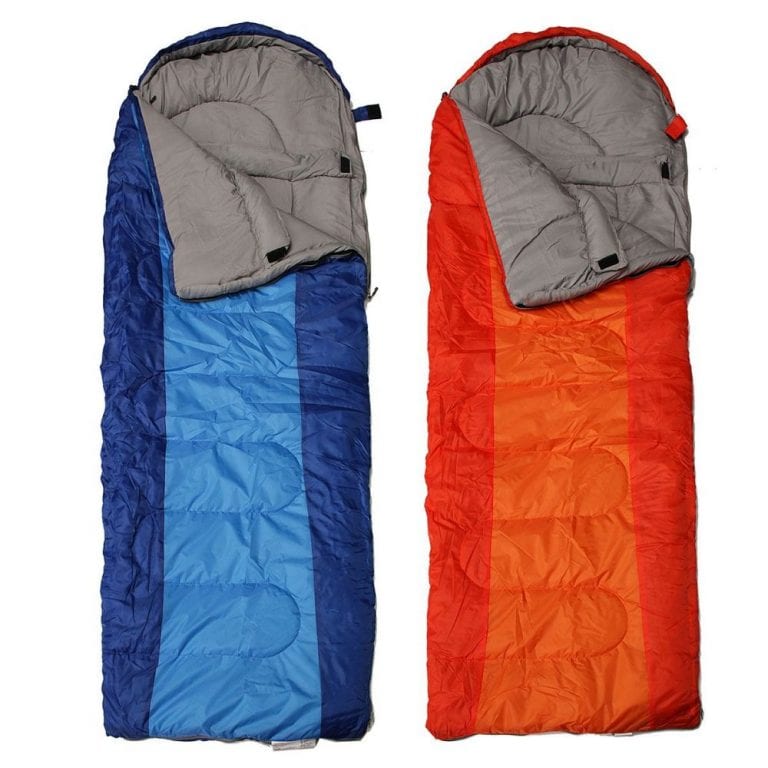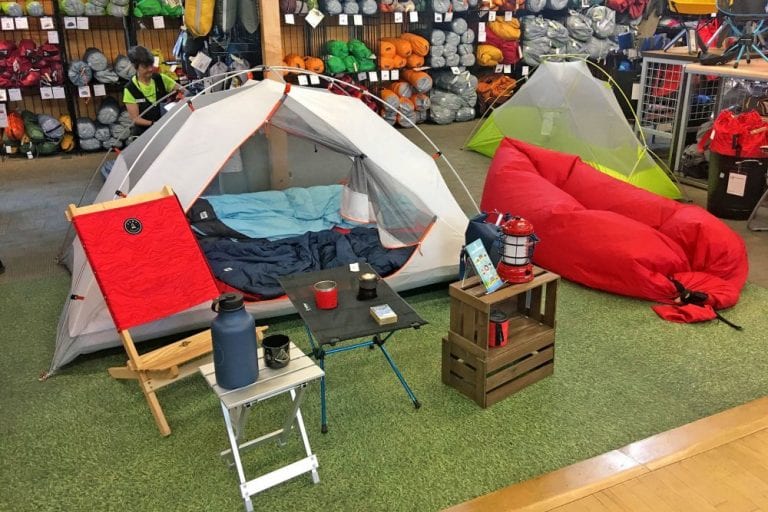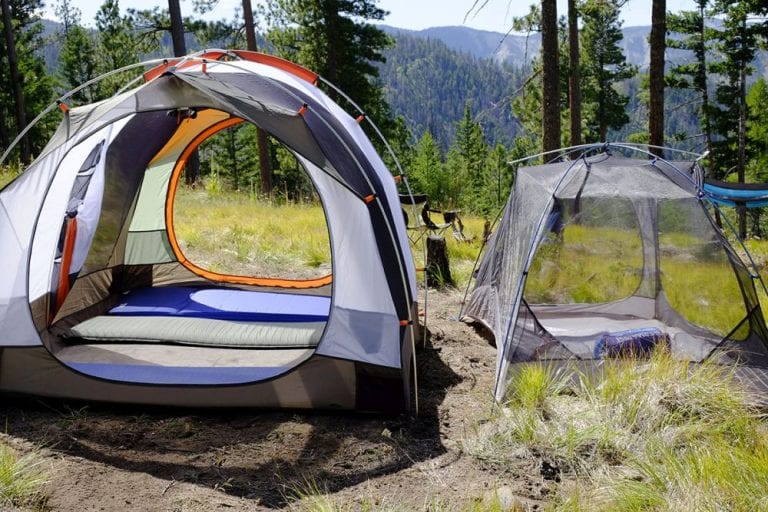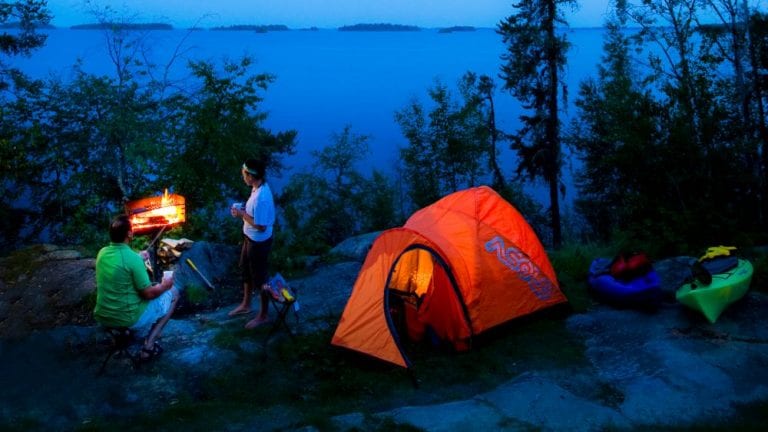Regardless of whether you are backpacking or camping, how can you improve the chances that you will sleep soundly outdoors?
- Using The Correct Type Of Equipment
- A Sleeping Bag
It is highly recommended that you use a sleeping bag with a temperature and style rating suitable for your particular destination.
For example, car camping sleeping bags are cut wider offering greater roll-around room that is good for comfort, but less efficient for retaining body heat. Certain rectangular camping bag styles can be fully unzipped and used as quilts on the mild nights, but they are still less beneficial as a sleeping bag.
Backpacking sleeping bags are mummy-shaped for a closer fit, lighter weight, and warmer in temperature. The majority of these bags are filled with duck or goose down which are compressed more easily than bags comprised from synthetic filling.
For some more guidance on sleeping bags, it is recommended that you read our articles on choosing sleeping bags for camping and backpacking. This will ensure you get a good night’s sleep and don’t spend the whole time waiting to get back to your Sleepys mattress.

image source: aliexpress.com
- Sleeping Pads
There are three separate types of sleeping pads – the self-inflating pad, the air pad, and the closed-cell foam pad. When car camping, weight is not a problem; therefore, you could opt for a wider, thicker sleeping pad for comfort. If you are backpacking, the weight issue is an essential detail; therefore, the super-lightweight pad or closed-cell foam pad is recommended. For more information on sleeping pads, it is advised that you read our article on how to choose sleeping pads and shop via the REI’s selection of pads, hammocks and cots.
- Pillows
Pillows are significant, so it is advised that you either bring one from home or use an inflatable or foam camping pillow. Some sleeping bags present with pockets to hold the pillow or folded clothing, such as a fleece sweater or down jacket. Shop for a selection of pillows at REI. You can view information from experts on the selection of pillows for camping on the TopTravelPoint website.
- Earplugs And Eye Masks
Eye masks can be beneficial when camping in the Northern hemisphere during summer or on campgrounds with poor lighting. Earplugs are useful to block out or reduce noises ranging from rustling in the bushes to your friend’s snoring. Many campers swear by earplugs to gain a good night’s sleep. Shop for earplugs and eye masks from REI’s sleep accessories selection.
- Preparing For Bed
It is important that you organize your campsite well before darkness descends, particularly the tent and sleeping area. This ensures you have time to relax and enjoy the evening; as well as contributing to a good night’s sleep. Here are some tips that will help you improve preparation for bed when camping.
- Choosing The Ideal Tent Site
The first step to preparing for bed is to make sure you choose a suitable tent site. The ideal site is a flat area with a durable surface cleared of rocks, sticks and pinecones. For more information, try reading our article on how to set up a tent.

image source: gonescamping.com
- Keeping A Light Nearby
Campers continue to be amazed at how dark the night will feel when outdoors. This is why it is recommended that you keep a flashlight or headlight handy. Try hanging a small LED lantern inside the tent as soon as it is erect; this way you can turn it on when preparing for bed. Some more modern tents are now available with built-in LED lights offering gentle glows for their users. Shop for camp lighting at REI’s selection.
- Repeating Familiar Routines
If your final task before heading to bed each night is brushing your teeth when at home, then you should keep this routine when camping; however, try to brush your teeth a distance from the camp. Routines trigger feelings of normality to a new environment and should be utilized, particularly with children. It may also be useful to have familiar bedding from home as this can be reassuring for children who are camping for the first time.
- Storing Food And Scented Toiletries Outside Of The Tent
Food-storage regulations differ according to the parks; therefore, it is recommended that you keep a canister with you if you are backpacking. Be sure to learn what the regulations are and adhere to them. Try to be neat with food and trash without any sloppiness. Bears are active in many camping sites, so it is advised that you do not sleep in clothing that may have absorbed food odor. For more information see our article on food storage and handling.

image source: switchbacktravel.com
- Wear Dry Clothing
Always change out of sweaty or dirty clothing when camping. Good sleepwear options when camping includes clean long underwear, clean socks, top and bottoms.
- Avoid Overdressing Before Going To Sleep
While you may think overdressing will keep you warm, wearing bulky clothing inside a sleeping bag will reduce the bag’s ability to trap your body heat. Instead of layering up instead the bag, try draping items on the outside for extra layers of insulation. You can do that or bring an old blanket from the house to act as an additional layer when camping.
- Urinate At Least Twice Before Going To Sleep
Some campers, particularly females, recommend urinating approximately twenty or thirty minutes before bed, and then again before climbing into the sleeping bag. This is useful as it helps avoiding any midnight bathroom visits.
- Prepare For Midnight Bathroom Visits
While you can attempt to prevent midnight bathroom visits by peeing twice before going to bed, it is possible that you may need to urinate overnight. To prepare for this, it is recommended that you place a pair of camp shoes or sandals in front of the tent door. You should also consider placing a camp towel outdoors to act as a doormat for when you return from the “restroom”; also, remember where your lamp is!
- Dealing With Thirst
To prepare for thirst during the night, it is recommended you keep a water bottle next to or within reaching a distance of the sleeping bag.
- Dealing With Outdoor Noises
Many newbie campers can become anxious when listening to the noises outside of the tent. While it is tremendous to hear an owl hoot, it is not so tremendous to think you have heard a bear walking around the campsite. Remember, the smaller critters also make noises and these noises can become louder when you are vigilant at night, so relax! If you have stored your food correctly, you should not have any problems. Grab some earplugs if you feel they will help, or you can use the white noise of a stream or rain to lull you to sleep.

image source: tourismsaskatchewan.com
- Staying Warm During The Night
On the warmer, more humid nights, you may not need to zip the sleeping bags to remain warm. In these situations, many campers will merely tuck their feet into the sleeping bag’s foot box or drape the bag across them similar to a quilt. If you expect the night to be warm, bring a light blanket or sheet as this is all you may need. If, however, the weather is cold, these tips may be beneficial to keep you warm during the night.
- Eat Your Meal Before Going To Sleep
Digestion is a process that warms the body internally and this can generate the heat needed to sleep well.
- Drink A Non-Alcohol, Warm Beverage
Warm beverages can make a person relax, but this should be non-alcoholic as alcohol dilates blood vessels resulting in heat loss.
- Use Dry Clothing As Insulation
To reduce the area your body needs to heat, it is recommended that you fill the empty spaces in the sleeping bag with dry clothing.
